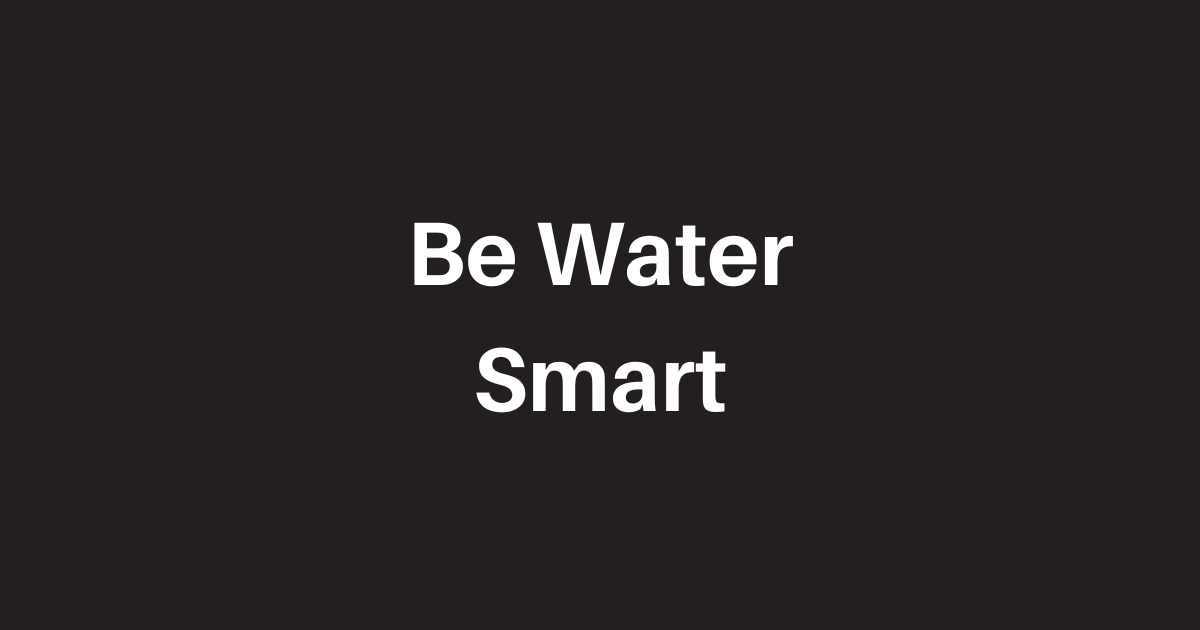Be Water Smart
Why should I be water smart?
You have likely heard of the severe droughts affecting the U.S. from California to Florida. In these states, water conservation measures have become a way of life. Residents and businesses have installed water-saving faucets, planted drought-resistant plants, and installed swimming pool covers to reduce evaporation in an effort to prepare for water shortages.
We live and work in the Midwest where fresh water is plentiful, so it may not seem as important to conserve water. But there are still some really good reasons to be water smart. You can benefit by saving money and energy, preserving the environment, and helping your local sewer district.
Most methods to conserve water can be achieved at little cost to you, while putting money back in your pocket. Water conservation saves on your water and electric bill. It also extends the life of your water heater, sump pump, and septic system. Here are some of our favorite tips to be water smart.
Tips to Save Money and Conserve Water
- Low-flow water saving faucets and shower heads use only 1.5 to 2.5 gallons per minute. A co-worker recently replaced his shower head with a low-flow head and saw a reduction of 1,000 gallons over a two month timeframe. These are easy to install and are cheap. Also you can fit your faucets with inexpensive aerators.
- Toilets use lots of water. Get low-flush toilets which use 1.0 to 1.6 gallons per flush instead of the 3-5 gallons used by traditional toilets. The newer generation of low-flush toilets works efficiently with just one flush.
- Get a hot water dispenser for your kitchen. You won’t need to waste water while waiting for the hot water to arrive. You can also insulate the hot water piping so the hot water arrives faster.
- Install a rain barrel – it’s easy. Rain water can be used for car washing, laundry, and landscape watering in most municipalities. Cisterns are bigger than a rain barrel and are typically stored underground. You may need special permission to install a cistern, so check with your municipality. Cisterns were common in the old days – our first house in Libertyville had a cistern that was hooked up to the washer. Rainwater has no chlorine so it’s also better for plants.
- Pool covers save 90% of the water which would otherwise evaporate. Cover your swimming pool when it is not in use to conserve water.
- Don’t let the water run while brushing your teeth, rinsing produce, hand-washing dishes, and washing the car.
- Purchase Energy Star appliances to save water and energy. Energy Star dishwashers use about 1.5 gallons of water per load, while hand washing can use up to 20 gallons!
- Leaky faucets and hose bibs can waste gallons of water every day. Often, all that is needed to repair a leak is to replace an inexpensive washer. Fixing leaks is one of the most effective ways to reduce your water usage.
- Don’t use the toilet to dispose of tissues and small trash – use the garbage can. If the toilet tank flapper ball gets stuck in the open position, change the chain or other equipment that is preventing it from closing.
- Fill the dishwasher and clothes washer before running it. Partial loads use just as much water as full loads.
- In the yard, plant native drought-resistant plants and mulch thoroughly
- Too slow evaporation and discourage weed growth. Water your yard early in the day and when it is not windy. Drip irrigation systems and soaker hoses are also a great way to use less water and get it where it’s needed most. You can help soil to hold water by adding organic matter too.
A final thought: When you are water smart at home or at your business, there is less water going into the sewage system – your town processes less waste and saves money. Also, there is less chance that untreated sewage will overflow and pollute area lakes and rivers. If your home or business is on a private septic system, like the house we grew up in, this is a much bigger deal.
Read more about how you can Be Water Smart:
http://environment.nationalgeographic.com/environment/freshwater/water-conservation-tips/




